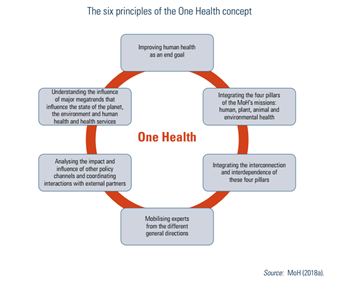-
26 March 2025 | Policy Analysis
A roadmap for healthcare decarbonization
2.3. Intersectorality
In recent years, the MoH has aimed to promote the One World, One Health principle to facilitate the appropriation of the universal objectives of the United Nations Horizon 2030 Programme by all the stakeholders (MoH, 2018a). The MoH developed its own operational definition of and approach to the concept based on six principles (see Fig2.3).
Fig2.3
The One Health approach is implemented through different themes, actions/projects and the creation of a medium- and long-term research programme. A governance model has also been developed to support and encourage this collaboration. Four prospective projects related to the following themes have been initiated: combating antimicrobial resistance, combating social inequalities in health and the environment, implementation of awareness-raising actions on the impact of travelling on health and the environment, and developing strategies to support health and food systems in the context of environmental challenges (MoH, 2018a).
In July 2019, the Belgian One Health Network was implemented with the aim of promoting the One Health approach and to bring together those working on it in Belgium (Sciensano, 2019a).
Concerning environmental challenges, the MoH also supports the Belgian National Environmental Health Action Plan (NEHAP),[3] which brings together the Belgian ministers responsible for health and the environment, and provides a coherent overall framework for environment–health action at all institutional levels. NEHAP is intended to be a toolbox towards achievements by promoting synergies at all levels, between actors, sectors, themes and policies (MoH, 2018a).
To make the health and environmental issues relevant and interpretable, the MoH also plans to promote the availability of data on human health, food safety and the environment for its different partners in the preparation and evaluation of related policies.
- 3. National Environmental Health Action Plan (NEHAP), available at https://www.nehap.be/en (last access 25 September 2019). ↰
Context, impetus and main purpose of the reform
At the 26th Conference of the Parties (COP26) in 2021, the critical role of health systems in achieving the Paris Agreement’s climate goals was emphasized. Belgium committed to the COP26 Health Programme, aiming to develop a climate-resilient, low-carbon and sustainable health system by 2050. This commitment is reflected in the Belgian National Environment and Health Action Plan (NEHAP). The third edition of NEHAP (NEHAP3), launched on 23 January 2024, includes ensuring a just transition to sustainable and low-carbon health systems.
Content of the reform and implementation steps taken
Belgium is in the initial stages of reform, that is, analyzing the problem and identifying potential solutions. As part of NEHAP3, Belgium partnered with Health Care Without Harm (HCWH) Europe and Arup to assess the greenhouse gas (GHG) emissions from its healthcare system and to develop a roadmap for decarbonization. This project was led by the Federal Public Service (FPS) Health and the Food Chain Safety and Environment and supported by regional administrations of Environment and Health.
The work estimated annual GHG emissions from the health sector at 9,901 kt CO₂eq, which represents around 5% of Belgium’s total emissions (2022: 202,025 kt CO₂eq). Projections indicate that without further policy action, emissions from the healthcare sector will rise, moving Belgium further from its commitment to a climate-neutral healthcare system. The roadmap proposes 16 measures grouped into three pathways.
The first pathway targets energy decarbonization, optimizing building systems, switching to low-carbon transport and increasing renewable energy use. The second focuses on optimizing the supply chain, including improving pharmaceutical use, prioritizing low-carbon suppliers and extending the lifespan of medical equipment. The third pathway aims at economy-wide decarbonization by aligning supply chains to strict standards and transitioning to sustainable suppliers.
While these measures will significantly reduce emissions, they may not be enough to achieve a near-carbon-neutral healthcare sector. Additional actions will be necessary, but this action plan offers a starting point for future efforts. It remains to be seen how fully these measures will be implemented by the Belgian authorities.
Evaluation
Environmental sustainability is now part of Belgium’s Health System Performance Assessment (HSPA) framework. A sub-dimension on environmental sustainability was added in 2023 when the framework was revised. However, due to timing and data availability issues, this sub-dimension was not included in the 2024 report. It will be addressed in a specific report expected by the end of 2025.
Authors
References
FPS Public Health (2024). Health & Environment Belgium. What is NEHAP? (https://www.environnement-sante.be/fr/propos-de-nous/quest-ce-que-le-nehap (in French) / https://www.leefmilieu-gezondheid.be/nl/wat-het-nehap-0 (in Dutch)).
Health & Environment, HCWH, Arup (2025). Greenhouse gas emissions of the Belgian health care sector. Brussels: Health and environment administrations of the National Environment and Health Action Plan, Health Care Without Harm Europe, Arup.
Health & Environment, HCWH, Arup (2025). Belgian roadmap for health care decarbonisation. Brussels: Health and environment administrations of the National Environment and Health Action Plan, Health Care Without Harm Europe, Arup.
KCE (2024). Ongoing projects: Study 2024-13 (HSR) Performance of the Belgian health system: Indicators for assessing environmental sustainability (https://kce.fgov.be/en/study-2024-13-hsr-performance-of-the-belgian-health-system-indicators-for-assessing-environmental)

